|
Industry
In the late 1950s and early 1960s
Wednesbury was still a successful manufacturing town
with large numbers of factories and diverse industries
of all sizes. A well known local company was Prodorite
Limited, based at Eagle Works in Leabrook Road. The
company produced a range of chemical coatings that were
resistant to corrosion, industrial floor materials, and
acid-proof constructions for tanks, floors, process
vessels, drainage and effluent systems, and fume
extraction.
Another, very different concern was
Geoffrey Hughes Limited, in Mounts Road. They produced
ladies’ and gentlemen’s clothing, mainly made to
measure, and also stock garments. The company
employed around 130 people in an up-to-date factory,
with a canteen, and a social club. Its garments gained a
reputation for quality, skilled workmanship, and good
value for money. |
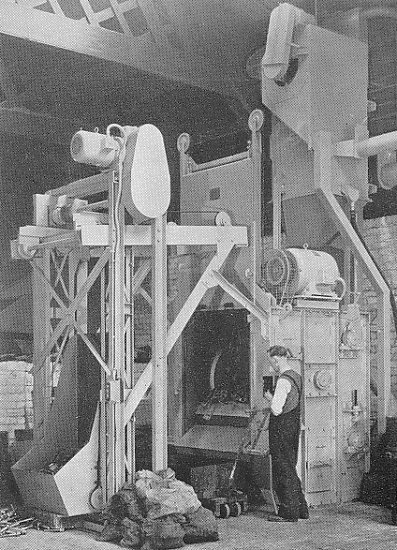
Up-to-date shot blasting equipment
at Frost & Sons (Moxley) Limited. |
Another local industry was galvanising. Frost & Sons
of Falcon Works, Church Street, Moxley specialised in
galvanising electricity transmission towers for the
Central Electricity Board, and galvanised every kind of
wrought and cast iron work, and tubes and fittings. The
company had a reputation for quick service, high quality
work, and low prices. The firm, which was founded in
1889 as tube and general galvanisers, subsequently
opened another factory at Rough Hills,
Wolverhampton for the galvanising of structural
steelwork, overhead transmission towers, and very long,
heavy sections.
A third factory also opened at Ebro Works, Tividale,
Tipton, which specialised in the centrifugal galvanising
of nuts, bolts, and washers etc.
The business survived until 2002 when it was wound-up
voluntarily, as can be seen in the notice below. |
|
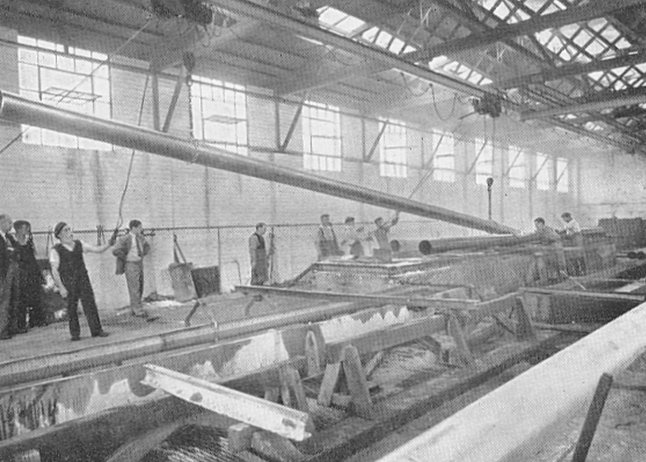
Galvanising tubes, 40 feet long
and 11 inches diameter, in Frosts' factory at Moxley. |
| The winding-up notice that
appeared in the Gazette newspaper. |
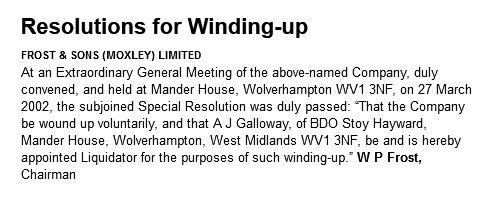 |
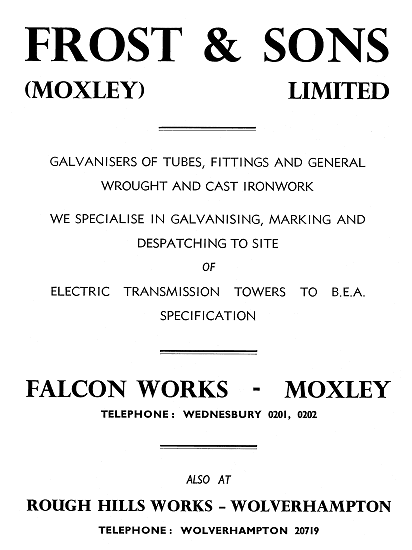
An advert from 1954.
| Another firm, Roberts & Company (Wednesbury Limited)
of Franchise Street, also specialised in galvanising
work for overhead electrical transmission lines, and
also manufactured signal ladders for the railway, and
iron work for lorry and bus bodies. |
|
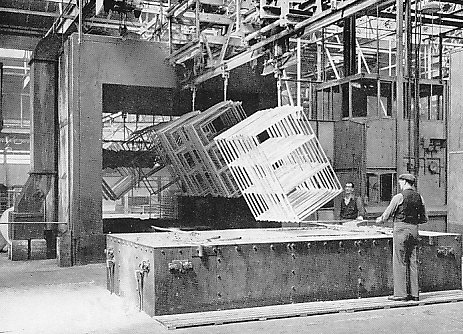
The large hot-dip galvanising tank
at Henry Hope & Sons Limited. |
A third galvaniser, Henry Hope & Sons Limited in
Woden Road, manufactured, and hot-dip galvanised the
companies own steel windows, which were made to the
highest standards. The factory contained highly mechanised plant, and
the deepest galvanising bath in the country, which
allowed the firm to galvanise all sizes of products for
other manufacturers, in large quantities, at an
economical cost. |
| For many years Wednesbury was well known for its
iron and steel works.
The Patent Shaft and Axletree Company, based in
Leabrook Road, had a long and successful life, and was
one of the first steelworks in the country to use a
Bessemer converter.
In fact Henry Bessemer conducted many of his early
experiments at the factory. |
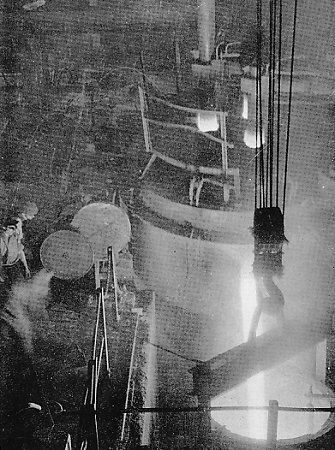
Tapping an electric arc furnace at
F. H. Lloyds. |
|
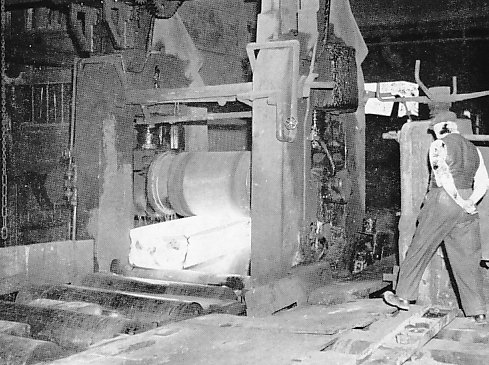
The old Patent Shaft cogging mill. |
By the late 1950s the company began to concentrate
on its rolling mills, and invested £8m in new plant,
including two 75 ton open hearth furnaces, modernisation
of the melting shop, and raw material handling
facilities, conversion of some of the existing furnaces
to oil firing, a new slabbing and blooming mill, a
rotary hearth-slab reheating furnace, and a new plate
mill.
The project increased the company’s ingot output to
300,000 tons per year, with a vastly superior finish. |
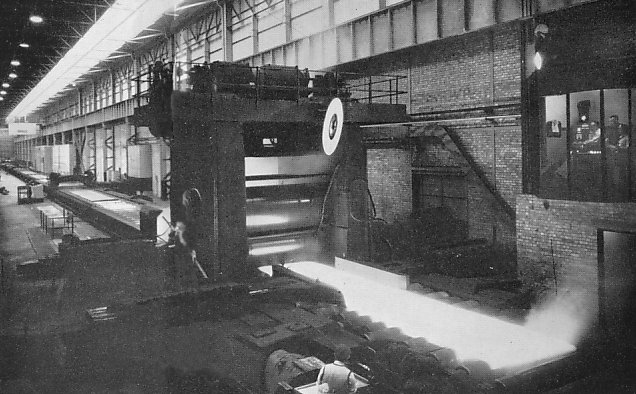
The new plate mill at the Patent Shaft Steel
Works.
|
A long-surviving steel company, F.
H. Lloyd & Company Limited, of James Bridge, was founded
in 1878. It had the largest steel foundry in the
country, and not only produced castings for the home
market, but also for many other parts of the world.
Another old company, John Bagnall &
Sons Limited of Leabrook Iron Works, manufactured wrought
iron, re-rollers of steel strip, bars and sections, and
undertook acid pickling, normalising, and annealing
steel strip and bars. The company’s rolling mills
produced steel strip in the range of 1 inch to 12 inches
wide, and in thicknesses of 14 gauge I.S.W.G. up to 1
inch. Bagnalls also manufactured square edged flats, and
steel tubes and fittings for the vehicle industry, and
splayed barrel hoops for the brewery trade. |
|
The once well known edge tool
manufacturer Edward Elwell Limited, in St. Paul’s Road,
Wood Green manufactured all kinds of high quality tools
for sale at home, and all over the world. In the late
1950s the company had completed a project to modernise
the factory and plant, to produce hand tools which could
not be surpassed anywhere in the world. The firm was
famous for its excellent axes, spades, shovels,
reaphooks, slashers, and choppers, of which it was
justifiably proud.
Wednesbury also had press working
companies including the George Clarke Presswork Company
Limited in Woden Road West. The firm carried out general
presswork, from small hand-pressed items up to power
presswork, with a capacity of 100 tons. Products
included ferrules, electrical pressings, washers,
pressings for the motor industry, springless oil seals,
welded fabrications, and turned parts.
Another important industry was
railway wagons, rolling stock, and locomotives, built at
the Old Park Works in Darlaston Road, by the Metropolitan Cammel Carriage and Wagon Company Limited. The company,
based at Saltley in Birmingham had four factories, and
in the late 1950s was the largest manufacturer of
rolling stock in Europe. |
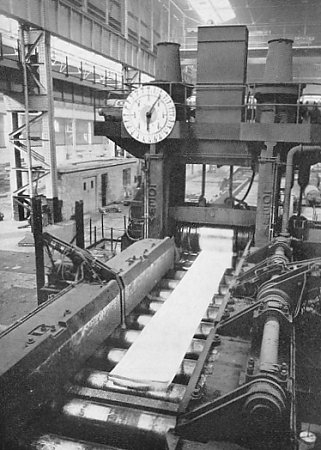
The new blooming and slabbing mill at the Patent Shaft Steel Works. |
| In 1961 Old Park Works produced the mechanical
structures for 35 electric locomotives for South African
Railways, the ‘Prestwin’ twin silo air discharge wagon
for carrying bulk powders, and a salt wagon for the
British Transport Commission. |
|
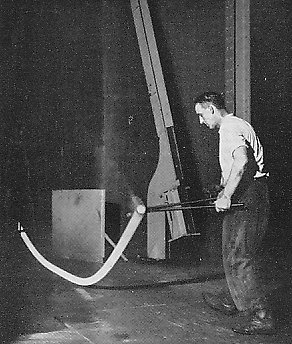
Extruding seamless pipe at
Prothero Works. |
Wednesbury had two prominent
electrical equipment manufacturers, William Sanders, and
the Power Centre. W. Sanders & Company (Wednesbury)
Limited of Falcon Works in Ridding Lane was enjoying its
last few years of independence. Within 6 years it would
become part of Westinghouse, move to Hungerford, and
soon face closure.
The firm produced all kinds of
switchgear from large installations to small fused
switchboxes, and fuse carriers, and fuses. Sanders’
products were sold at home and abroad, and the Sanders
name was known throughout much of the world. The company
employed around 60 people.
The Power Centre was based in Lloyd
Street, and Elwell Street. It came to Wednesbury in
1908, and later became part of the Electrical Division
of Tube Investments Limited. Its products were
distributed through branches of the Simplex Electric
Company limited, also part of the Tube Investments
group. |
|
The Elwell Street factory opened in
1958 and had the most up-to-date plant for the
manufacture of busbar trunking, and cable trunking.
Other products included electrical distribution
equipment, switchboards, cable boxes, and busbar
systems.
Another, and very different company
was The Hallen Engineering Company Limited in Portway
Road which became well known for its high quality
work. The firm specialised in machining casting, forgings, and the production of
all kinds of turned parts. Customers included the
Admiralty, the Air Ministry, the Ministry of Supply, the
Post Office, British and Foreign Railways, Docks and
Harbour Boards, and the Atomic Energy Commission. |
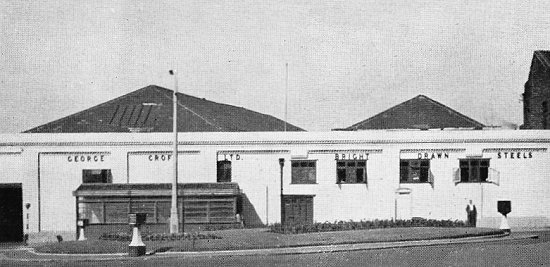
George Croft Limited on the High Bullen.
|
A landmark at the High Bullen, by
the traffic island, was Newbright Steel Works, run by
George Croft Limited, producer of bright drawn steel,
high quality centreless precision turned bars, and
tested steels to War Office, Admiralty, and British Rail
specifications. During the 1950s and 1960s the firm
prospered thanks to customer good will, and high quality
products.
One of the important products,
produced in vast numbers throughout the Black Country
was washers. They were produced in large numbers in
Wednesbury by Charles (Wednesbury) Limited at Bridge
Works in Bilport Lane, off Holyhead Road, near the
bottom of Holloway Bank. The firm produced all kinds of
washers in steel or brass, including bright steel turned
and chamfered washers, plain bright steel washers, and
roofing and engineers black washers. The firm was run by
C. and R. A. Pugh. It was founded in 1930, and still
exists today, employing 110 people. |
 |
|
 |
Return to
Education |
|
Return to
the contents |
|